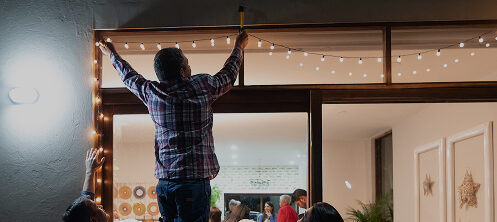The holiday season is all about bringing warmth and cheer, and let’s face it — nothing says holiday magic quite like dazzling light displays. However, while you prepare your decorations, some questions can arise. Specifically, you might be asking: Can my electrical system handle my holiday light display?
It’s important to consider whether or not your electrical system can handle your holiday light display safely. In this blog, we’ll discuss tips to prepare your electrical system for the holidays, how to make your display safer and more efficient, and when it might be wise to reach out to a professional.
Is Your Electrical System Ready for the Holidays?
Holiday lights can be a joy, but they also demand a significant amount of electricity. Before plugging in all those decorations, it’s crucial to evaluate whether or not your electrical system can handle your holiday light display. The last thing you want is to overload a circuit or cause damage to your electrical panel. A few simple steps can help prevent unnecessary strain on your home’s electrical system during this festive season.
Check Your Electrical Panel
Your electrical panel serves as the control center for all the power flowing through your house. Before setting up a big holiday display, it’s essential to understand the panel’s capacity. Each circuit on the panel has a certain amp limit, and overloading it can trip breakers or even cause a fire hazard. If you’re unsure about the state of your panel or wondering if your electrical system can handle your holiday light display, consider scheduling an inspection with professional electricians.
If your panel is outdated or shows signs of wear, turn to PGA Inc. for assistance. An electrical panel replacement in Wausau, WI, might be necessary to support your holiday setup. Upgrading to a modern panel will not only help during the holiday season but also benefit the entire electrical system year-round.
Map Out Your Circuits
An important aspect of preparing your electrical system for the holidays is knowing how many circuits your home has and where they’re located. Generally, appliances and fixtures run on specific circuits, so knowing what’s already drawing power can help you avoid overloading any single circuit.
If your holiday lights share a circuit with high-energy appliances, such as the refrigerator or HVAC, try redistributing your holiday load across other circuits. For example, consider plugging outdoor lights into a garage outlet, which might be on a separate circuit. Avoiding the use of the same circuit for multiple power-hungry items can help reduce the risk of overloads or circuit breaker trips.
Understand Your Outlet Options
Different outlets serve different purposes in the home, and knowing which outlets to use can make your display safer. If you’re setting up lights outside, be sure to use a GFCI outlet, as it’s designed to prevent shock and can withstand outdoor conditions. GFCI outlets are required in any area that might be exposed to moisture, such as the yard or areas near doors.
If you’re short on outlets, it might be tempting to use extension cords or power strips. While convenient, they should only be used when necessary. Overloading these can create a fire hazard, so check that each power strip or extension cord is rated for the wattage of your lights. And remember: only use outdoor-rated extension cords for any outdoor lighting to avoid any safety risks.
How Much Power Do Your Holiday Lights Really Use?
As you prepare your electrical system for the holidays, understanding the power demands of your lights can help you set up a safe and stunning display. Here’s a breakdown of the wattage and energy consumption of various holiday lighting options:
LED Lights vs. Incandescent Bulbs
LED lights are a popular choice for holiday decorations because they use less power, making them a safer and more efficient option. While traditional incandescent bulbs might use up to ten watts per bulb, LED holiday lights only consume about 0.1 to 1 watt per bulb. This difference not only helps save on your electricity bill but also puts less strain on your home’s electrical circuits. Switching to LED lights can reduce the risk of overloading and tripping your circuit breakers.
Calculating Wattage and Amps
So, can your electrical system handle your holiday light display? To determine the answer, you can calculate how much wattage your lights are using. The wattage is often listed on the light packaging, but if it’s not, you can estimate it based on the bulb type. Divide the total wattage by your circuit’s voltage (usually 120 volts in a U.S. home) to find the amperage. Compare this to the amp limit on your circuit breaker, and avoid exceeding 80% of the breaker’s capacity to maintain a safe buffer.
For example, if you’re plugging in a light display that uses 600 watts on a 120-volt circuit, the display will draw about five amps. If this is on a 15-amp circuit, you’d still have ten amps of capacity left, keeping you within a safe range.
Avoiding Circuit Overload During the Holiday Season
To avoid circuit overloads and protect your home from electrical risks, here are some practical steps you can take:
Spread Out Your Holiday Lights
Try to spread the power load across different circuits in your home. For instance, plug indoor lights into circuits separate from your kitchen or living room appliances. Doing so helps balance the load and reduces the chances of overloading a single circuit, making the overall setup safer.
Avoid Daisy-Chaining Power Strips and Extension Cords
It’s best to avoid connecting multiple power strips or extension cords, as this can lead to circuit overloads and is a fire hazard. Always check the ratings of each cord and power strip, and limit the number of lights plugged into one outlet.
Opt for Surge Protectors
Surge protectors can provide an extra layer of safety for holiday displays, especially in areas prone to power fluctuations. They’re designed to protect your electronics by diverting excess power if there’s a surge, making them a wise investment for both lights and indoor decorations.
Use GFCI Outlets for Outdoor Lights
GFCI outlets are especially important when powering holiday displays outdoors. Not only do they reduce the risk of shock, but they’re also required by code in most outdoor and wet areas. If your outdoor outlets aren’t GFCI, consult a professional to install these outlets, providing peace of mind and compliance with safety standards.
Brighten Your Holidays Safely With PGA Inc.
Getting your home ready for the holidays is an exciting part of the season, and a stunning light display can add joy to your celebrations. But as you plug in those decorations, keep safety and your electrical system’s capacity in mind.
If you need help preparing your electrical system for the holidays, PGA Inc. has got you covered. Our Wausau electricians offer reliable services to get your home ready for Christmas festivities and beyond. Schedule a service today, and let us help you enjoy a bright and safe holiday season!



